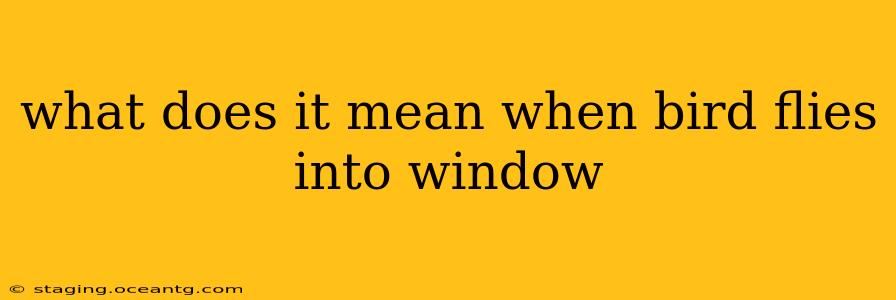What Does It Mean When a Bird Flies Into a Window?
Birds flying into windows are a sadly common occurrence. While some might attribute mystical significance to such events, the reality is usually far more straightforward: it's a matter of birds misjudging their surroundings. This article will explore the reasons behind this behavior and address some common questions surrounding it.
Why do birds fly into windows?
The primary reason birds collide with windows is misperception of the environment. Windows, especially those reflecting surrounding vegetation or skies, can appear invisible or transparent to birds. They see the reflection of trees, bushes, or the sky and attempt to fly through what they perceive as open space, resulting in a collision.
Several factors contribute to this misjudgment:
- Reflection: Glass reflects the surrounding environment, creating a deceptive image of open space. The clearer and cleaner the glass, the more likely a bird is to mistake it for an unobstructed passage.
- Ultraviolet (UV) light: Birds can see UV light, which humans cannot. This plays a role in how they perceive the world, and the way windows reflect or absorb UV light can further contribute to misidentification.
- Speed and trajectory: Birds flying at high speeds might not have enough time to react once they realize their mistake. Their trajectory, especially during migrations, often involves swift movements that leave little room for error.
- Type of window: Certain types of windows, particularly those with low-E coatings designed for energy efficiency, can be more reflective and harder for birds to see.
What should I do if a bird hits my window?
If a bird hits your window, the first thing is to assess its condition. If it seems unharmed, simply observe it from a distance. Most birds will recover on their own after a few minutes. However, if the bird appears injured, take appropriate action.
- Check for injuries: Look for signs of bleeding, broken wings, or disorientation.
- Provide a safe, quiet space: If the bird is injured, gently place it in a cardboard box lined with soft material, away from noise and pets.
- Contact a wildlife rehabilitator: Wildlife rehabilitators are trained professionals who can provide the necessary care for injured birds. Search online for "wildlife rehabilitator near me" to find one in your area. Do not attempt to care for the bird yourself unless you have the proper training and experience.
Are there ways to prevent birds from hitting my windows?
Yes, there are several preventative measures you can take to reduce the risk of bird collisions:
- Window decals or stickers: Applying decals or stickers to your windows, particularly in areas where birds are likely to fly, can help break up the reflection and make the glass more visible to birds. Consider using patterns or images that are easily visible to birds but unobtrusive to your home's appearance.
- Bird-friendly window films: These films are specifically designed to reduce reflectivity without obscuring your view.
- External shading: Adding external blinds, awnings, or trees near your windows can help to further reduce reflections.
- Netting: Installing netting around vulnerable areas can prevent birds from approaching the windows in the first place.
How common are bird window collisions?
Bird collisions with windows are a significant conservation problem, resulting in millions of bird deaths annually in North America alone. The exact numbers are difficult to determine, as many collisions go unnoticed.
What is the best way to clean bird droppings from windows?
Cleaning bird droppings promptly is important to prevent staining. Use a solution of warm water and mild detergent, and wipe the area clean with a soft cloth. For stubborn stains, a commercial glass cleaner might be necessary.
By understanding why birds collide with windows and taking proactive steps to prevent it, we can help protect these important creatures. Remember, the solutions are often simple and can significantly reduce the risk to bird populations.
